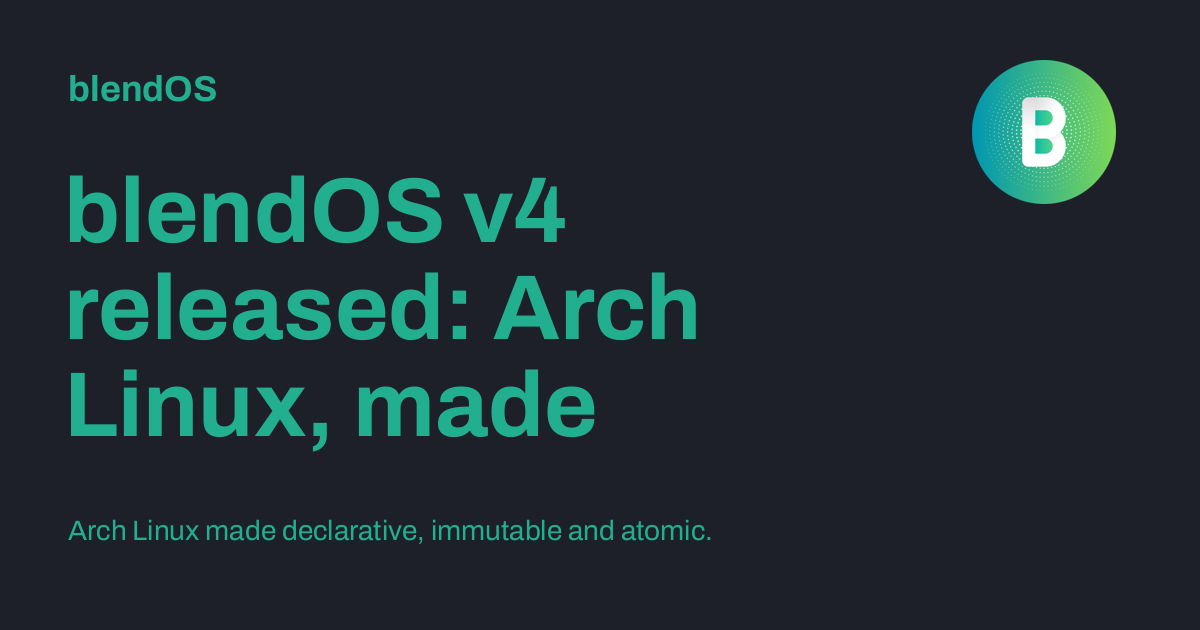- cross-posted to:
- linux@programming.dev
- linux@lemmy.world
- cross-posted to:
- linux@programming.dev
- linux@lemmy.world
I’m not super clear on what being declarative and atomic means in an OS context. Does it mean there’s a file describing what packages are installed, kind of like nix?
I am no expert, please correct me if I’m wrong
From what I understand, it’s like Nix but Arch based. The
/system.yamlfile contains all of the packages installed on the system.Also it’s the worst when you download an operating system and you realize that it’s mutable
You’re like “oh no I did not want the mutable one I wanted the immutable one”
I know what all words mean
Interesting. Do they point to arch repos or provide their own like Manjaro? I haven’t thought about a rolling release atomic distro before.
Just the Arch repos with an additional repository (similar to EndeavourOS), so AUR packages do work as intended and are in fact officially supported.
(disclaimer: blendOS dev here)
I just wanted to say this is all very confusing. I barely installed Ubuntu on my laptop as a daily driver mostly due to the MS Recall debacle. It’s fine, it’s great. However, reading all the Linux Lemmy posts makes me feel like I’ll never understand. I know all these words and what they mean, just not in an OS context.
Think about it this way: going onto Linux communities and listening to what people say can be like listening to car mechanics chat.
But do you need to know what all of that stuff means to drive your car? Nah. But that info could come in handy, if you wanted to modify your car or something like that.
You don’t need to know what Wayland/X11, PipeWire, GTK4/Qt6, or anything like that is, in much the same way you don’t need to know what PowerShell, Event Viewer, NT kernel, or registry are to use Windows.
- repeat the “Don’t sweat it.”
- Ubuntu is a perfectly fine starting point (the other “beginner distro” that’s commonly recommended is LinuxMint)
- »AFTER« you become comfortable with what you have:
- try familiarizing yourself with the command line
- far more competent than Windows
cmd.exeor PowerShell - !linuxupskillchallenge@programming.dev
- far more competent than Windows
- get overwhelmed with all the distro choices available
- get bitten by the distro-hopping bug (“Gotta try them all!”)
- and then try Distrobox (“ALL the distros at once!”)
- get bitten by the distro-hopping bug (“Gotta try them all!”)
- try familiarizing yourself with the command line
- »THEN« take a look at immutable distros
- “immutable distro” is a catch-all term that embraces several concepts
- immutable – the root filesystem is set to read-only – makes it harder to mess up your system
- declarative – your hardware and packages and configs are declared in a master configuration file
- atomic / transactional – updates are checked as they’re applied, if it fails, it gets rolled back to a previous “safe state”
- container / sandbox – ex. Flatpak or Docker or OCI – apps are isolated in their own sandbox and not allowed to mess up anything else
- “immutable distro” is a catch-all term that embraces several concepts
You probably think of yourself as pretty knowledgeable regarding Windows, but have you ever studied for a Microsoft certification exam? This in depth knowledge is not something the average user needs for his daily usage, but can be interesting to read/know.
Don’t sweat it. There were people doing advanced things in Windows that would probably have blown your mind as well. It’s just that most people that use Linux just enjoy tinkering for the sake of tinkering so it’s more visible, and Linux lends itself to people doing weird and wonderful things never envisioned by it’s creators.
You just started on the road, where you stop is entirely up to you. Just know that the view is way more interesting going this route. Take a few pictures on the way.
Welcome to the Linux community. :)
You will probably never understand everything about Linux and all of its included and associated systems. That’s completely fine, no one does! That’s why we are many, and it’s what asking for advice or help is for. You can just learn whatever interests you at your own pace, and know that there will always be interesting things you haven’t seen yet.
don’t worry. this probably isn’t for you… yet… anyway, why did you install ubuntu??? who misguided you? you should have gone linux mint DE, mx linux, Fedora or something like that. Ubuntu was great… 15 years ago. Sorry if I sound too hard… take it with a laugh 😁
No. Fuck this shit. Don’t do this.
It’s already bad when everyone in this community shoves their distro down potential linux-converts’ throats, thereby confusing them even more. Don’t tell (or imply to) freshly converted users that they potentially made a wrong choice.
TF do you think they’re going to do now? Move to fedora? The commenter above already stated that it was a hassle to install Ubuntu and now you’re telling them to change distros already???
Ubuntu is still great… compared to Windows. Sure. It may not hold to your ideals. Compared to other distros, canonical may make some questionable choices. BUT THEY DON’T IMPLEMENT A FUCKING RECALL. So it’s fine (for now).
Ubuntu is fine for newcomers. It has a shit ton of support online and you can easily search questions whose answers are likely to be found within the first few results.
So stop shoving distros down people’s throats, especially fresh users.
I know you said:
Sorry if I sound too hard… take it with a laugh 😁
It doesn’t come across that way. You come off as a gatekeeper.
Ok. Yeah, commenters are right. First of all, congratulations for switching. Enjoy ubuntu as a great first step. If you have issues, consider it might be ubuntu and not linux as a whole. In the future, consider other options like the ones I gave. Sorry for the not-contributing comment.
jesus christ
😇do you know how to add repos to atp? That’s pretty important, or you may end up installing .dep manually, which I not recommend for people that want a OS that just works
Is there a “light” version, without a WM? I run Hyprland on my current Arch setup.
Indeed, you can just write your own custom
/system.yamlfile with the hyprland package (or no WM/DE for that matter). This guide describes how you can do that: https://blendos.co/install/post-install/intro/ (use the ‘custom’ track and add ‘hyprland’ to the package list)(disclaimer: blendOS dev here)
Sweet, been waiting for this one. I wonder how it will compare to NixOS or Kinoite.
*Fedora Atomic
Its a huge bundle of tons of variants, likely 40 or so, if you take everything that uBlue, wayblue and secureblue produce
And that’s without counting the roll-your-own variants. uBlue has been a remarkable project.
- Fedora Atomic has been a remarkable project ;D
Fedora builds the container images, even though they themselves use OSTree remotes. There is a Change Proposal to change to them.
This means they continuously build the container images without even using them!
Only because of that the standard container workflow actions (they use an Ubuntu container!) even work. But for sure their tooling is very useful
A very dumb question probably, but I’m new to using Linux so I lack a lot of understanding: I’m on Bazzite atm. Would there be a simple way to switch to blend OS without wiping everything? Like a rebase? Probably not but I figured it’s worth a shot to ask xD
deleted by creator
Is there a guide or any educational material on this? I’m about to swap to Linux (some fedora distro focused on gaming) and I’m interested in potentially one day swapping to arch after I’ve gotten my toes wet. Doing a bit of extra work and planning ahead to make that easier sounds nice.
deleted by creator
No such thing, we all start somewhere! :)
Anyway, you could in fact do that if you were thinking of trying out other Fedora Atomic images such as Silverblue and whatnot (see also the ublue page listing tons of others, including your bazzite!). This uses different tooling, so unfortunately not in this case.
bazzite is fedora based? If so, your filesystem is btrfs and your /home is a subvolume, same as your / (root). you can install a new operating system in a btrfs subvolume (e.g. /blendosroot), then have systemd-boot or grub mount it as root and mount your existing home from it.
sadly, there’s no noob-friendly way to achieve this, but if you’re adventurous, you have enough search terms to make it happen.










